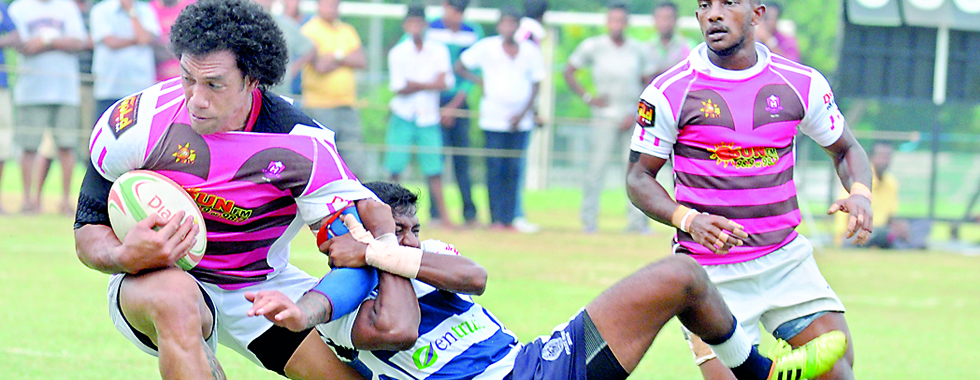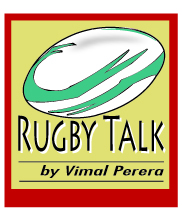Havelocks can trouble the top four
View(s):The fourth week of rugby has opened the gate wide open for a keen contest among the first four. They are Navy, Kandy, CR and Army who so far have lost one game each.
The top four are followed by Havelock’s, CH and Police. Of these I would think Havelock’s pose a threat to the top four in the weeks ahead. The threat and the close contest are real. The same however cannot be said of the quality of rugby that is on display. The games are getting closer and are building tension among clubs that stand equal among each other and not because they play a brand of rugby that is resplendent with technical skills and talent that see them stand among the top teams in Asia.

Havelock’s got back to winning ways but needs more power to forge ahead in the weeks to come - File pic
Of the matches last week the most interesting and somewhat better game of rugby was the match between Kandy and Navy which was won by Kandy.
Kandy who lost a few weeks before appeared to have put that bad performance to history. Yet to annex the crown they have to be utilizing their capabilities: being more professional as they are capable of. Navy who were cruising solid blinked this time leaving Kandy to make use of that moment. Reminds of the late 80s cola war described by Enrico in his book ‘The Other Guy Blinked – How Pepsi won the Cold War’. This year the top teams have blinked in one game or the other and the war will continue.
The match between CR and the Sharks did not produce much in terms of thinking that the Red Shirts are a team that could make it to the top. Playing Sharks who are one of the teams lying at the bottom the fancied CR never looked like a side that is proficient and capable of winning a cup and seemed to be going through the motion while being heavily dependent on their imports. They did run a number of tries but that was  playing average rugby against a side that was less than average.
playing average rugby against a side that was less than average.
Army despites resting some of the foreign players did take Air Force head on and marked a comfortable win. The problem I see in the Army team and what they need to brush up is the tendency to be offside at the break down. Cut down the penalties that are given and the forward march will be better than getting back at each penalty.
Havelock’s got the better of CH in a game that had a light shining but needed more power to forge ahead in the weeks to come. They seem to be capable in doing just that but it appears that something is holding them back. The number of penalties in this match is of concern. Then they are not alone in the penalty count as most others too are conceding the gain as they get punished at the break down.
One problem I see, hear and read about is the constant whining except for a team or two that takes the focus away from correcting your mistakes. The effort is more to satisfy others and will not do much for the improvement of the game as always there is somebody else who has to be blamed.
Despite the constant complaints there are people who come and tell the referee you had a good game or it was lovely refereeing. The point here is that these comments are only made when the match official is from another country and not one of our own. The hope is that one day we build a culture that will be learned as we appreciate referees from other countries.
I thought I will pen some comments after the recent match played in Twickenham between England and New Zealand. Both Stuart Lancaster and Steve Hansen have made comments about the match and the issues arising by decisions of Nigel Owens. One is about the Cruden try which was given without a referral to the TMO and the other being the yellow card which was given after consulting the TMO. The arguments are that the TV footage showed that the try was short and the Yellow card was not there according to the TMO. With all the technology the referee was struggling to hear the TMO and ruled on the yellow looking at the screen.
Commenting further “New Zealand coach Steve Hansen expressed alarm at what he regards as a creeping issue of home-based replays governing official decisions after the 72nd-minute try was belatedly referred by Owens as the conversion was about to be taken.
“My concern is not the ref or TMO, it is that TV producers are starting to have an influence on the game,” said Hansen. If something goes wrong we see a replay 10 times. The ref has not seen it, the touch judge has not seen it, the TMO has not seen it — we need to bring in a challenge so that if the coach or skipper has seen it, he can challenge”. We don’t need a TV producer replaying it 100 times. That’s not the spirit of our game.‘Referees will make mistakes just like players will, and sometimes those mistakes will cost you the game. You have to live with that and some days you will get the rub of the green. ‘The TV producers are starting to annoy me somewhat.’
Vimal Perera is a former Rugby Referee, coach and Accredited Referees Evaluator IRB


